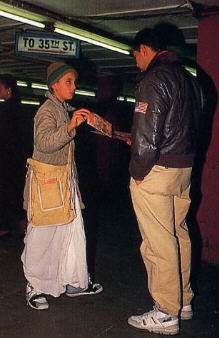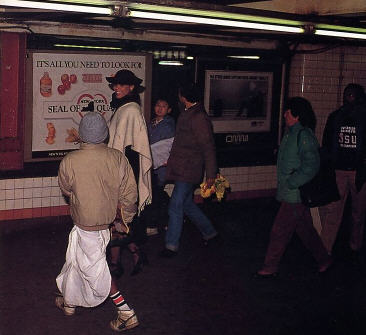Subway Saviors by Muralivadaka Dasa
At Christmastime these kids go
underground to give the gift of love.
The screeching of the subway car announces our arrival at the next station. "Gentlemen, this is it!" I say, lifting a box of Back to Godhead magazines as I get up. The subway grinds to a halt, and seven young men surge toward the sliding doors. As we step onto the platform, a disembodied voice crackles: "Thirty-fourth Street-Harold Square Macy's. Have a nice holiday."

"Is this where we distribute?" Nine-year-old Jaya Saci, the youngest member of our intrepid band, is on his first Christmas book-distribution marathon in New York City.
"No, not here. We go upstairs to the next level. It's much better there!" replies fourteen-year-old Kirtana, veteran of four subway campaigns. Kirtana is not only the senior "man" in distribution experience, but his hard work and enthusiasm over the years have established him as one of the best. In fact, he wasn't even scheduled to go this year, but he begged his parents and his teacher, me, to allow him to come.
Moving amid the bustling crowd and incessant noise of the subways, I remember the beginning of last year's marathon. When we first arrived, a New York City policeman began to stare intently at us. He pointed and waved, indicating that someone should come over. As I started toward him, I noticed he was pointing vigorously to someone other than me. He called out, "You! You!" He wanted Kirtana.
Glancing apprehensively at me for permission. Kirtana slowly went over to the officer. Engrossed, we all watched as the policeman and Kirtana had a short, animated conversation. Suddenly the officer grabbed Kirtana by the arm and began shaking his hand. Both of them broke into huge smiles.
Kirtana came running back. "Muralivadaka Prabhu, you know what happened? When I got over there, the policeman said, 'I know you, young man. Isn't your name Kirtana? I remember you from last year.' Then he grabbed my hand and started shaking it, saying, 'Keep up the good work. son!' "
Thirty-fourth Street station is well patrolled by police, who have always looked kindly on our efforts to distribute our Society's literature here every Christmas. That's one reason I keep bringing the boys back here. And because the station is underground, the boys are sheltered from the inclement weather.
Coming to the top of the stairs, we're greeted by the acrid smell of perspiration and urine.
"Look! Look!" says Jaya Saci, pointing to two vagrants sleeping atop sheets of cardboard and covered with an assortment of coats long ago discarded by their original owners. "Do they live here?" His innocence contrasts sharply with the callous, unseeing attitude of the New Yorkers racing past the prostrate figures.
"That's nothing!" replies Govinda dasa, who will turn twelve on Christmas day. This is his third year, and he speaks with confidence. "Coming down here is like going to one of the hellish planets described in the Fifth Canto of the Bhagavatam. You'll see lots of strange things."
A group of Peruvian musicians is performing to a large crowd in a spot designated for such activities. "Who are they?" asks Sita Rama, as I hurry to the pole that for the last four years sheltered our books, coats, and any weary warrior in need of a break. Sita Rama, eleven, has been affectionately nicknamed "Pundit" by the adults who live on the farm in Florida where our school is located. The next eight days will often find him happily engaged in lengthy philosophical discussions with people three, four, and five times his age. One, two, three, four, five, six, seven. I count heads silently. "Everyone come here for a second." As they gather round, I think of what last-minute encouragement or inspiration I can offer them.
This activity of trying to give people literature about the Supreme Lord is based on a very profound philosophy. According to the Vedic literature, the self is purely spiritual, an infinitesimal part of the Lord. But when the spiritual sparks come into this material world, they become covered with a material body and forget the Lord and their relationship with Him.
We can awaken our original, eternal consciousness of God through bhakti-yoga,or devotional service. It begins with hearing about God and culminates in pure love for Him. By giving someone a magazine about Krsna, these boys are helping the forgetful souls progress toward life's perfection.
Krsna is very eager for us to return to His kingdom. Therefore He sends His representatives and even comes Himself. Out of His infinite love for His fallen children, the Lord descended five hundred years ago as Sri Caitanya Mahaprabhu just to show by His example the process of reaching out and giving the forgetful souls an opportunity to reawaken their eternal love for Him and to return back home to Godhead. Thus the activity these boys are about to begin is the highest welfare work, and it follows the tradition set by Krsna Himself.
As I look out at the seven bright faces straining to hear what I'm about to say. I realize that they are as familiar with this philosophy as I am. As students in thegurukula, a school where spiritual values are an integral part of the curriculum, they learn that the act of reaching out to others with knowledge about Krsna is the logical and practical culmination of their studies.
"Approach as many people as possible. You can give the magazine for free if they really want it, but ask everyone for a donation; they'll be more likely to read the magazine and reluctant to throw it away. OK, ready?" They all nod.
"Oh, one more thing." Eight years of experience in training children in book distribution has taught me a little about what difficulties to expect. "The number of books you distribute and how much you collect is up to Krsna. He's the controller of all results. But we can try really hard, no matter what happens. That's a practical demonstration of our love for Him. Remember, it's not going to be easy to get someone to take a book about God. OK, go to it."
Like a well-drilled football team breaking the huddle, the boys whirl and enter the masses of people whizzing by.
"Excuse me, sir here's your gift."
"A holiday gift, Ma'am. Here you go."
"Get your Christmas gift yet?"

The girls and boys of our Vaisnava Academy have been distributing books for eight years now, and yet as I watch I'm struck anew at this amazing experience: children trying to stop frenzied New Yorkers to give them a book about Krsna.
I focus in on Krsna dasa. Although he's only nine and this is his first time in New York City, he goes about the distribution as if he were in the familiar setting of our farm in Florida or his home in Dallas.
"Here's your gift," he says to a fashionably dressed man in his early thirties. The man stops, reaches down, and, taking the magazine in his hand, stares at Krsna dasa. "This is for me? Is it free?" the man says, a bit surprised at the sight of a shaven-headed boy wearing a dhoti and standing just about even with his belly.
"You can have it free." Krsna dasa replies gravely, "if you promise to read it. But it would be nice if you gave a donation." This is too much for the cosmopolitan New Yorker. He bursts out laughing while he reaches into his pocket to give Krsna dasa some change. "Is this all right?"
"Yes, thank you very much. Hare Krsna." Krsna dasa replies very seriously. Carefully putting the money away, he takes out another magazine. "Excuse me, Ma'am; here's your gift!"
The boys quickly settle into a routine. Approaching person after person until one finally stops, they patiently try to persuade people of all sizes, shapes, and philosophies to take a Back to Godhead magazine or a book and give a donation.
"More magazines, please!" Pavan Kumar, at sixteen the oldest of the boys, comes over to where I'm standing. Pavan's father is a seventh-generation Ayur-vedic physician in Lucknow, India. Pavan, who will be the eighth-generation practitioner, joined us a year and a half ago. Last year was his first marathon, and the culture shock of coming from a well-to-do neighborhood in Lucknow to the depths of the New York subways was a bit much for him. This year, it's a different story.
"The last man I approached was a Muslim," Pavan says as I ready more books for him. "He was nice. I explained to him that we all worship the same God; it's just that He has different names. 'Just like you,' "
Pavan continues, smiling, " 'you have several names, so why can't God?' The man liked that He took a magazine and gave me a dollar."
Of course, not everyone's nice. Uddhava is thirteen and from Trinidad. He walks slowly toward me, a look of frustration on his face. "I give up! No one will even stop! Take a book? They won't even look at me or say anything. They act just like I'm not even there. And then, finally, one man stops. That guy!"
Uddhava points out an immaculately groomed man about forty, an overcoat over his dark, well-tailored suit. But he's staring in our direction as if trying to bum us to ashes with his glance.
Uddhava continues: "He took the magazine in his hand and said to me. 'Is this gift for me?' I told him yes. Then with a grotesque smile, he held the magazine right in front of my face and ripped it to pieces!"
We talk about how hard it is to get people to listen to God's message, and not only for Hare Krsna devotees. In all religious traditions, great souls encounter difficulties. Christmas celebrates the birth of one such personality who met a violent reaction to his preaching.
This short discussion rekindles Uddhava's enthusiasm, and he's off. The Vedassay that this material world is a place where people want to forget God, and our young heroes are getting firsthand experience of this.
As the days go by, the boys become more and more absorbed in the marathon. They ask if I can take a group out early, before breakfast, and a group out after everyone else is done at night.
And so the "special forces" are inaugurated. Two and a half hours before the nine o'clock breakfast is served at the Brooklyn temple, three boys and I go out to the subways. This time we don't go to any one station but simply ride the trains. Walking through the cars, the boys ask each of the passengers to take a magazine. Often they sit down next to a person and talk about Krsna consciousness. When the train stops, it's off to the next car.
Our main arena is still Thirty-fourth Street. The boys get a wide range of responses. Govinda tells of a woman interrupting his conversation with someone: "This is horrible, disgusting. Stop immediately!" She raves on while a second woman enters the scene talking even louder "This is wonderful. I love what you're doing. Please continue." The first woman, stunned by this sudden turn of events, becomes silent and then storms away. Then the second lady turns to the person Govinda first approached and says, "Now take a magazine, and give a donation!" Kirtana meets someone who saw Srila Prabhupada at 26 Second Avenue. Govinda meets a professional boxer. Pavan gives a conductor a magazine through a window and gets a donation.
The boys confront many misconceptions about Hare Krsna children.
"Do your parents know what you're doing?"
"Yes. They're very proud of me. Would you like to call and ask them?"
"Why aren't you in school?"
"We are. There's our teacher. We're learning to help people understand God. Isn't that the essence of Christmas?"
"It's horrible that you're forced to do this!"
"Forced? It's fun! As Christmas approaches we can't wait to begin."
Frequently the money collected is the issue at hand.
"You boys are being exploited. You're working hard to collect money and someone is living off the results!"
Kirtana patiently explains: "The money first goes for our expenses. Whatever is left goes to a school project. For example, the money from last year's marathon helped pay for our four-month school trip around America."
Back at the temple, the boys trade stories while taking their meals.
"One nice old lady told me I was the cutest little girl she'd ever seen. So I took off my hat and showed her my shaved head. Boy, was she surprised!" The boys all laugh.
Often the difficulties come up.
"No one would stop for me. They'd just go by and yell curse words at me."
"One man told me if I were his son, he'd beat me bad if he ever caught me doing this."
"One women told me to get out of there before she called the police! When I offered to take her over and introduce her to one of the policemen, she got all flustered and stormed away."

Occasionally the boys are asked about our girls. They explain that the Vedic system of education is to separate the boys and girls at an early age to insure that each group can concentrate on their studies. But the girls are also out distributing, the boys proudly conclude; they're down south in Florida.
At the Thirty-fourth Street station, a priest comes up to me, shakes my hand, and tells me how intelligent these boys are. "Keep up the good work, and God bless you." A moment later Uddhava comes and explains what happened.
Krsna dasa had stopped the priest and a conversation had ensued. Uddhava soon joined the discussion.
"When he said he follows Christ, I asked him if he eats meat. He said yes, and I asked, 'Why? When Lord Jesus said "Thou shall not kill." why are you killing the cow?' He tried to say that the cow has no soul. I said, 'The Vedas explain that all living entities are spiritually equal, but they inhabit different kinds of bodies. The cows are living entities just like us. I've got personal realization of this because I take care of the cows and milk them every day on our farm.' Then he stopped arguing, took a magazine, and gave a donation."
Sita Rama talks for forty-five minutes with a Christian who finally takes a magazine and gives a dollar. "She couldn't answer the question about a sincere pious person who lives his whole life without any contact with Christians and never hears about Christ. Does he go to hell because he hasn't accepted Jesus? Or is there another way? I told her the Vedas accept any religion as bona fide if it leads to love of God. That's when she took the magazine and gave a dollar."
Here is the essence of this unique program. When the philosophy of Krsna consciousness is challenged and the boys must speak up in its defense, their beliefs and realizations become strengthened. The truth and beauty of the Vedic philosophy become alive and meaningful.
As we head back to the temple on Christmas eve, our marathon finished, we pass a laundromat. "Can we try in there?" Govinda and Uddhava ask. My nod sends them running inside. Soon they return, big smiles on their faces. "The last man I approached." Govinda says." was just sitting and reading a newspaper. 'Here's something much better to read,' I said, giving him a magazine. He looked through it and then took out a ten dollar bill, gave it to me, and said, 'I think what you're doing is great.' " The boys were both laughing. "We think it's great too; a great way to end a great marathon!"
The Vedas reveal that Krsna lives within everyone's heart and He is the witness of all our activities. Thus He can reciprocate according to the desires and activities of each person. These children, by their valiant effort to distribute books about Krsna. are experiencing realization of the reciprocation a person can feel when he tries to serve God. That's the spiritual lesson our students learn by this program of trying to share a gift of love.
Source: http://backtogodhead.in/subway-saviors-by-muralivadaka-dasa/






